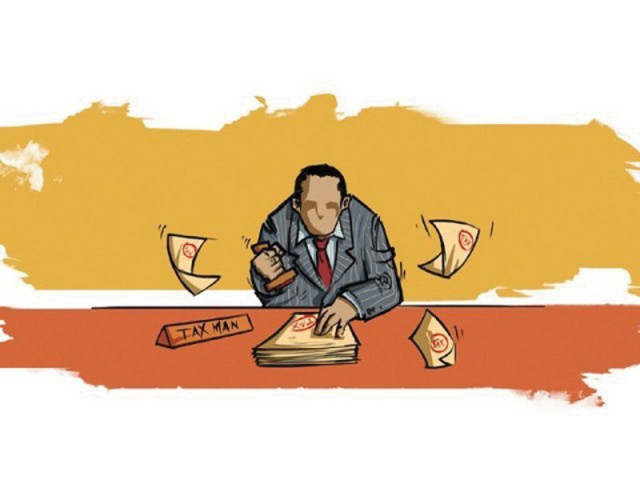View from McLeod Road: Why the mini-budgets will not work
The obsession with numbers is unhealthy and destroying the nation’s institutions

The obsession with numbers is unhealthy and destroying the nation’s institutions. ILLUSTRATION: JAMAL KHURSHID
The saddest thing about watching Finance Minister Ishaq Dar on television is that he actually thinks he is in charge. The confident smile, the coy answers to reporters’ questions, even his proclivity to hold more press conferences on average than most of his predecessors. You might think the man is actually pursuing his own agenda. The reality, however, is that Dar is being played by the bureaucrats at Q Block and does not even realise it.
In the 1980s, British political satire Yes, Minister, the fictional minister Jim Hacker is told that one of the worst things that can happen to a politician is to be described by the Civil Service as “a pleasure to work with”. That was not meant as a compliment. It meant that the top bureaucrats in Hacker’s department, Sir Humphrey Appleby, had managed to run rings around the minister and had him so thoroughly “house trained” that the minister was effectively doing the bureaucrats’ bidding without even realising it, stymying his own agenda in the process. Minus the wit and humour, one suspects Finance Secretary Waqar Masood feels the same way about Dar.
The case of the mini budgets
So forget all those mini-budgets that you see the finance minister announcing on television, where he is trying ever more desperately to get closer to an already downward revised tax collection target that we all know they will miss yet again this year. To understand what is really happening, you have to think about what is going on in the Civil Service’s heads.
Here is the way the boys’ club at Q Block views the world: to them, they have to meet their numbers every year, by hook or by crook. What makes the finance ministry unique among its counterparts around the world is that they seem to be completely indifferent to whether they meet revenue numbers through tax collection or borrowing, and that they have an absolute – and I do mean absolute – inability to look beyond the closest June 30 in the future.
These two facts about their worldview have two implications. The first is that the finance ministry will use whatever conjuring trick it needs this week to get the next tranche released from the IMF. In this, it is helpful to think of them as a junkie trying to get his next fix. He will do whatever it takes to get the next one, and will swear upon all that is holy that this is the last one. The second implication, and the far more damaging one, is that they will freely burn the country’s institutions to the ground if it means that the danger happens next year but they still meet their numbers this year.
How does this translate into policy? Have you noticed how the entire obsession is on tweaking the tax rate here and there to make the numbers go to where they want to? These tweaks – like raising the sales tax on diesel from 17% to 37% – are meant to fulfill the short-term promises made to the IMF so that they can get the next tranche. I am not exactly revealing state secrets here when I tell you that all of those tweaks are based on back-of-the-napkin calculations. There is absolutely no corner anywhere in the FBR building or Q Block in Islamabad that is dedicated to analysing the impacts of tax policies. Sadder still, nobody in power seems to think we need one.
The difference between Dar and his predecessor Hafeez Shaikh, was that at least Shaikh, being a trained economist, could see the damaging impact of the short-run decisions they were taking. He realised that the obsession with the short run was destroying the long-term institutional capability to raise taxes sustainably. Sure, he would still ultimately go along with what the bureaucrats wanted, but you could tell he was not a believer right up to the very end. Dar appears to have had a sincere conversion to the Q Block faith.
Ultimately, of course, while the bureaucrats are the ones driving the show in a damaging direction, they are only doing so because of the restrictions placed on them by politicians. As far back as 1947, our politicians – both civilian and military – decided that they would rather beg for money from Washington than impose a tax on their friend whom they might be meeting for tea at Sind Club. Even if we were to get a finance minister not quite so well house-trained, how do we fix that?
the writer is an editorial consultant
Published in The Express Tribune, March 2nd, 2015.
Like Business on Facebook, follow @TribuneBiz on Twitter to stay informed and join in the conversation.



















COMMENTS
Comments are moderated and generally will be posted if they are on-topic and not abusive.
For more information, please see our Comments FAQ